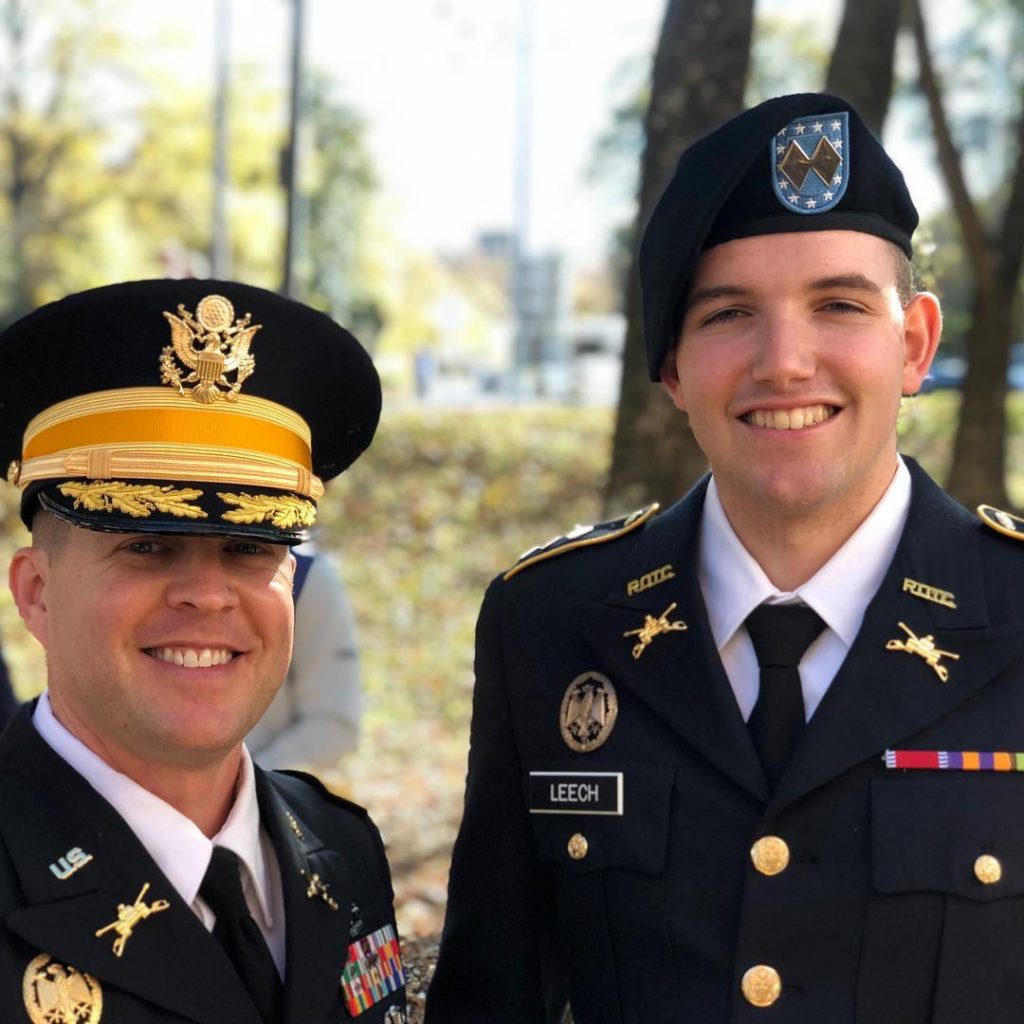
As other new graduates start their first post-college jobs, History major Jake DiMartinis and History minor Connor Jacobs Leech will begin their months-long Basic Officer Leader Course. DiMartinis and Leech are cadets in the ROTC, and both will commission as second lieutenants in the U.S. Army after graduating in May.
For cadets, or officers-in-training, participating in the Army ROTC during college requires discipline. DiMartinis, Leech, and the other cadets take Army classes every semester and must earn a minor in Military Science. Three mornings per week, the cadets do an organized workout session at Smith Field House. On some days, they go running, and on others, they walk around campus wearing heavy backpacks. On Wednesdays, the cadets practice infantry tactics, often at Battle Park. They also perform in the color guard at UNC sporting events.
“ROTC does, on the surface, sound like it’s a lot, and that it might interfere with your school, but it never really has,” Jake DiMartinis said. “I feel like it’s enhanced my college experience, and I think both the academic side of things and ROTC side of things have made me a better leader.”
Developing leadership skills has been especially important for DiMartinis and Leech during their final year in ROTC. All seniors hold staff positions, but Leech and DiMartinis were selected as battalion commanders in Fall 2018 and Spring 2019, respectively. The battalion commander oversees the entire battalion, managing staff, creating training schedules, and generating policies. To prepare for these staff positions, DiMartinis, Leech, and the other cadets attended a month-long Advanced Camp, or officer leadership training course, the summer before their final year of college.
Jake DiMartinis believes his history education helped prepare him for Army leadership training. “A lot of times when we’re learning about leadership in our classes, we look at historical examples, and not just American history. History definitely plays a role because that’s how we learn, we look at those case studies,” he said. Connor Leech expects his training in history to make him a better leader in the Army: “History is so extremely important not just for understanding the lessons we’ve already learned as an army and what other armies have learned, but also because as an Army officer you’re always trying to look toward the future, and it’s always important to have that context.”

Leech sees lessons for Army officers in topics far removed from U.S. military history, including his senior thesis. Leech wrote a paper that compared seventeenth-century Irish peasant unrest to eighteenth-century English peasant unrest as part of Dr. Wayne Lee’s Burch Field Research Seminar in Exploration, Colonialism, and Violence in London. “The English aristocracy didn’t see the Irish for anything more than the financial aspect, rather than as members of their community,” Leech explained. He pointed to situations where Army officers might work with populations facing internal conflict. “If you are unable to see groups that you’re attempting to guide to a better place economically and politically as members of your community, then you’re never really going to successfully be able to do things like counter-terrorism or stability operations, which are so important these days,” he said.
While DiMartinis and Leech believe that learning history can help Army officers develop leadership skills, Leech also encourages History majors to take Army classes, even if they have no intention of joining the military. “A lot of times the people who do come and take our Army classes are able to get a little more perspective on how the Army looks at problems and how the Army interacts with history, and it really adds another level of why history matters.” Leech explained. “I think that the Army is an organization where there is a very concrete argument for why history matters.”
Although both DiMartinis and Leech participated similar training during their time in ROTC, their paths will diverge after they graduate and go on to their Basic Officer Leader Courses. ROTC cadets are assigned to one of sixteen different Army branches. DiMartinis will join the Military Police, where he will oversee a platoon of approximately 32 soldiers doing work in law enforcement operations, convoy security, and refugee resettlement. Leech will become an Armor Officer, commanding tanks in reconnaissance operations.
Both are committed to the Army for at least four years after graduation, but they are considering further academic training. Leech might return to graduate school to study history, and DiMartinis would like to become an attorney. Both are thinking of doing so through the Army– after all, they have wanted to join the military for most of their lives. In fact, Dimartinis sees his long-time passion for history as one of the reasons the decided to pursue a career in the military in the first place: “Growing up, I was a big history buff, and I loved studying history. I think that inculcated a desire for public service in me.”
– Aubrey Lauersdorf
